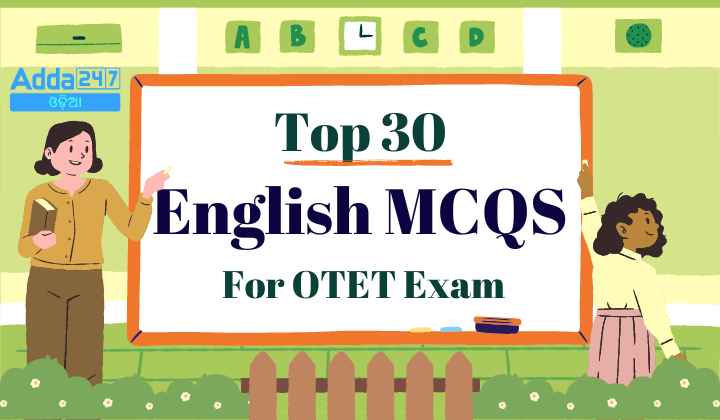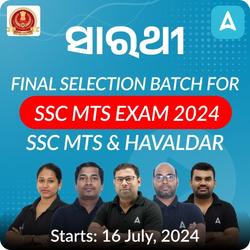Preparing for the OTET exam requires a strong foundation in English grammar and comprehension. Our curated list of the top 30 English Multiple Choice Questions (MCQs) covers key areas such as idioms and phrases, synonyms and antonyms, parts of speech, verb tenses, and correct verb forms. These questions are designed to test and enhance your understanding of essential concepts, ensuring you are well-equipped for the exam. Each question is carefully selected to reflect the types of questions likely to appear on the test, providing a valuable tool for effective exam preparation.
Top 30 English MCQS For OTET Exam
- What is one key objective of learning English at the upper primary level?
(a) Memorizing vocabulary
(b) Understanding basic grammar rules
(c) Developing communication skills
(d) Learning to write essays
Ans: (c) Developing communication skills - Which of the following is not a basic skill of language?
(a) Listening
(b) Speaking
(c) Reading
(d) Memorizing
Ans: (d) Memorizing - What is interdependence of skills in language learning?
(a) Learning one skill exclusively
(b) Developing each skill separately
(c) Integrating all language skills for overall proficiency
(d) Focusing on grammar only
Ans: (c) Integrating all language skills for overall proficiency - Which of the following is a challenge of teaching English as a second language at the upper primary level?
(a) Lack of interest in students
(b) High proficiency of students
(c) Availability of resources
(d) None of the above
Ans: (a) Lack of interest in students - Which skill involves the ability to understand spoken language?
(a) Listening
(b) Speaking
(c) Reading
(d) Writing
Ans: (a) Listening - Teaching prose at the upper primary level should focus on:
(a) Grammar rules
(b) Vocabulary memorization
(c) Comprehension and critical thinking
(d) Writing skills
Ans: (c) Comprehension and critical thinking - What is a principle of language teaching?
(a) Emphasizing translation
(b) Using only the native language
(c) Encouraging active student participation
(d) Rote learning
Ans: (c) Encouraging active student participation - Which of the following is a method for teaching creative writing?
(a) Dictation
(b) Rote memorization
(c) Storytelling and journaling
(d) Grammar drills
Ans: (c) Storytelling and journaling - Assessment of comprehension and language skills should include:
(a) Only multiple-choice questions
(b) Oral, written, and interactive activities
(c) Grammar translation method
(d) Only written tests
Ans: (b) Oral, written, and interactive activities - What is the importance of learning English?
(a) It helps in understanding complex mathematics
(b) It is essential for global communication and access to information
(c) It is only needed for academic purposes
(d) It is a requirement for all jobs
Ans: (b) It is essential for global communication and access to information - Passage 1: Prose
“The sun set in a blaze of orange, casting long shadows over the bustling market. Vendors called out their wares, while children ran about, laughter mingling with the hum of conversations. Amid the chaos, an old man sat quietly, his eyes scanning the crowd with a mixture of nostalgia and longing.”
What is the main activity described in the passage?
(a) A sunset.
(b) A market scene.
(c) An old man’s thoughts.
(d) Children’s games.
Ans: (b) A market scene. - How is the old man feeling in the passage?
(a) Angry and frustrated.
(b) Happy and content.
(c) Nostalgic and longing.
(d) Anxious and worried.
Ans: (c) Nostalgic and longing. - Passage 2: Poem
“Amid the golden fields of grain,
Where sunlight dances in the rain,
A solitary scarecrow stands,
Guarding crops with outstretched hands.”
What is the central image of the poem?
(a) Golden fields of grain.
(b) Sunlight dancing in the rain.
(c) A solitary scarecrow.
(d) Outstretched hands.
Ans: (c) A solitary scarecrow. - What literary device is primarily used in the poem?
(a) Metaphor.
(b) Simile.
(c) Personification.
(d) Hyperbole.
Ans: (c) Personification. - Which part of speech is the word ‘quickly’ in the sentence ‘She ran quickly’?
(a) Noun
(b) Verb
(c) Adverb
(d) Adjective
Ans: (c) Adverb - Change the narration: He said, “I will help you.”
(a) He said that he would help me.
(b) He said that he will help me.
(c) He said that he can help me.
(d) He said that he should help me.
Ans: (a) He said that he would help me. - Identify the correct tense: ‘She has been studying for two hours.’
(a) Simple present
(b) Present continuous
(c) Present perfect continuous
(d) Past continuous
Ans: (c) Present perfect continuous - Convert to passive voice: ‘They are watching a movie.’
(a) A movie is watched by them.
(b) A movie is being watched by them.
(c) A movie was being watched by them.
(d) A movie has been watched by them.
Ans: (b) A movie is being watched by them. - Fill in the blank with the correct article: ‘He is ___ honest man.’
(a) a
(b) an
(c) the
(d) none
Ans: (b) an - Identify the correct part of speech: ‘The quick brown fox jumps over the lazy dog.’
(a) Noun
(b) Adjective
(c) Verb
(d) Adverb
Ans: (b) Adjective - Convert to indirect speech: She said, “I am reading a book.”
(a) She said that she is reading a book.
(b) She said that she was reading a book.
(c) She said that she has been reading a book.
(d) She said that she will be reading a book.
Ans: (b) She said that she was reading a book. - Identify the tense: ‘They had finished their work before I arrived.’
(a) Past perfect
(b) Present perfect
(c) Future perfect
(d) Past continuous
Ans: (a) Past perfect - Which of the following sentences uses a proper noun?
(a) She went to the store.
(b) He is my friend.
(c) Paris is the capital of France.
(d) They are playing outside.
Ans: (c) Paris is the capital of France. - What is the correct form of the verb in the sentence: ‘She _____ to the market every day’?
(a) go
(b) goes
(c) going
(d) gone
Ans: (b) goes - Choose the correct preposition: ‘He is good ___ playing chess.’
(a) at
(b) in
(c) on
(d) with
Ans: (a) at - Identify the part of speech for the word ‘beautiful’ in the sentence: ‘She is a beautiful dancer.’
(a) Noun
(b) Adjective
(c) Verb
(d) Adverb
Ans: (b) Adjective - What is the synonym of “terse”?
(a) Verbose
(b) Elaborate
(c) Laconic
(d) Detailed
Ans: (c) Laconic - Which word means “extremely greedy for wealth or material gain”?
(a) Terse
(b) Irrefutable
(c) Avaricious
(d) Sordid
Ans: (c) Avaricious - What is the antonym of “sordid”?
(a) Dirty
(b) Pleasant
(c) Miserable
(d) Greedy
Ans: (b) Pleasant - Which verb means “to collect and hold”?
(a) Conceive
(b) Impound
(c) Stretch
(d) Neglect
Ans: (b) Impound










